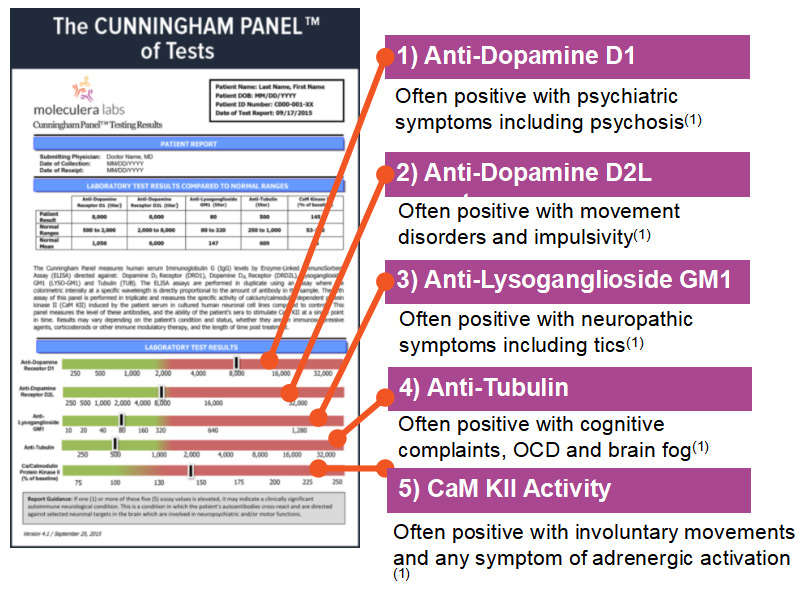Presentation reviews Cunningham Panel™ biomarkers
Biomarker test helps detect autoimmune basis for neuropsychiatric symptoms.

Understanding the Cunningham Panel
In this video presentation, Dr. Craig Shimasaki reviews the biological significance of each biomarker in the Cunningham Panel™ and discusses how antibodies produced during an immune response can impact neuronal function and result in a variety of neuropsychiatric symptoms.
The presentation examines autoantibodies against neurological biomarkers and a cell-stimulation assay, and their association with specific neurologic and psychiatric symptoms including OCD, tics, anxiety and other cognitive impairments. Positive tests on any of the Cunningham Panel™ assays suggest that a patient’s symptoms may be associated with an infection-triggered autoimmune condition.
Identifying whether there is an underlying autoimmune basis for neuropsychiatric behaviors can help direct targeted treatments toward immunomodulatory therapies. The discussion reviews the biomarkers: Dopamine D1 and D2, Tubulin, Lysoganglioside and the cell stimulation assay-CaM kinase II.
Dr. Craig Shimasaki explains how each of the Cunningham Panel™ tests help identify the biologic basis for infection-mediated neurologic autoimmune conditions.*
Read: PANS/PANDAS treatment guidelines are included in this special edition of JCAP.2-4 The guidelines, drafted by 44 medical and scientific leaders representing 23 academic institutions from the US, Canada and Australia, provide an evidence-based standard of care for treating patients with PANS/PANDAS. The authors include experts in the fields of child psychiatry, pediatrics, infectious diseases, microbiology, neurology, neuroimmunology, immunology and rheumatology.
Download The Articles Below
- Overview of treatment of PANS – an introduction
http://online.liebertpub.com/doi/pdf/10.1089/cap.2017.0042 - Psychiatric and behavioral interventions
http://online.liebertpub.com/doi/pdf/10.1089/cap.2016.0145 - Use of Immunomodulatory therapies
http://online.liebertpub.com/doi/pdf/10.1089/cap.2016.0148 - Treatment and prevention of infections
http://online.liebertpub.com/doi/pdf/10.1089/cap.2016.0151
* Thank you to the Illinois PANDAS/PANS Advisory Council for holding this summit and providing video footage.
- Reported by Dr. Amiram Katz based upon his 112 patients studied and our patient responses.
- Swedo SE, Frankovich J, Murphy, et al. Overview of Treatment of Pediatric Acute-Onset Neuropsychiatric Syndrome. J Child Adolesc Psychopharmacol.2017;27(7):562-565.
- Thienemann M, Murphy T, Leckman J, et al. Clinical Management of Pediatric Acute-Onset Neuropsychiatric Syndrome: Part I-Psychiatric and Behavioral Interventions. J Child Adolesc Psychopharmacol. 2017;27(7):566-573.
- Thienemann M, Murphy T, Leckman J, et al. Clinical Management of Pediatric Acute-Onset Neuropsychiatric Syndrome: Part II—Use of Immunomodulatory Therapies. J Child Adolesc Psychopharmacol. 2017:27(7):574-593.
- Murphy T, Pasternack M, et al. Clinical Management of Pediatric Acute-Onset Neuropsychiatric Syndrome: Part III—Treatment and Prevention of Infections J Child Adolesc Psychopharmacol. 2017: 27(7): 594-606.








